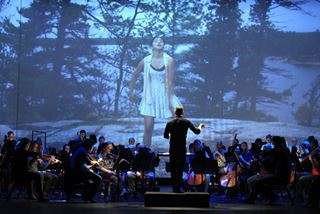|
Back
High performance, creative perils Ottawa
Southam Hall, National Arts Centre
01/14/2016 -
Dmitri Shostakovich: Symphony No. 9 in E-flat major, Op. 70
Erich Wolfgang Korngold: Violin Concerto in D major, Op. 35
John Williams: Theme from “Schindler’s List”
John Estacio: I Lost My Talk (World premiere)
Daniel Hope (violin), National Arts Centre Orchestra, Alexander Shelley (conductor)
Monique Mojica (actor), Donna Feore (creative producer and director), Barbara Willis Sweete (filmmaker), Santee Smith Tekaronhiahkhwa (choreographer), TURBINE (visual design)

(© Dave Chan)
Alexander Shelley’s tenure as music director for Ottawa’s National Arts Centre Orchestra (NACO) continues the conductor’s keen focus on Canadian work with social/political themes and on the possibilities of multimedia presentation. I Lost My Talk, with music by Ontario born John Estacio and text by the Mi’kmaw elder and poet Rita Joe, C.M., invites obvious comparisons to Dear Life, based on a story by Alice Munro, premiered here by Shelley and NACO last September.
Again, we have a text concerning a mature woman recalling an unhappy early life, in this case within Canada’s former Residential School System which forced Aboriginal children to sacrifice native language and culture in an environment of psychological, physical and even sexual abuse. This has been a political scourge in Canada for decades and related restitution was a hot-button issue in the nation’s federal election last October. Politics are as much a part of I Lost My Talk as are music, speech, dance and photography, and a major patron for the work is the family of the Right Honourable Joe Clark, P.C., C.C., A.O.E., former Prime Minister.
Lasting about twenty minutes, I Lost My Talk is high on impact and could hardly be otherwise. Like Dear Life four months ago, it generated the kind of ovation more common at a rock concert than a symphony orchestra performance. However, if it can be isolated from its political context and related conundrums, it doesn’t fare so well. The music has the punch of a Hollywood blockbuster and owes more to recent film composers (notably Alan Silvestri) than to anything from even recent classical music, or anything particularly or arguably Canadian. The elaborate percussion sequence leading to the work’s final climax was the most original stretch of I Lost My Talk, almost a melding of jazz and Stravinsky.
The projections (using the same rear cyclorama and front scrim used for Dear Life) were clichéd and sometimes downright mediocre and I believe the work would have greater impact (and be less costly to produce) without them. Do we really need outdoor dancers in trite choreography blatantly borrowed from Martha Graham and Jerome Robbins (yes, West Side Story)? (The collage of mainly older photographs used for Dear Life were more appropriate for that work and never seemed trivial or superfluous as did the action film for I Lost My Talk.)
First Nations actress Monique Mojica gave fine delivery of the brief text, keeping her speech and movement simple and a welcome contrast to the over-the-top music and film accompaniment. Again, I Lost My Talk earns a solid ‘A for effort’, though is unlikely to find a permanent place in Canada’s longer term performing arts repertoire.
The earlier parts of the program were a kind of pops concert, and the prime unifying factor was Alexander Shelley’s increasingly immaculate, tight control of his players. Shostakovich’s Symphony No. 9 was composed in 1945, though seems a salute to Prokofiev’s “Classical” Symphony No. 1, written almost thirty years earlier. Shelley put the work under a virtual microscope: no detail was left without attention and finesse, and he is getting the best playing we’ve ever heard from NACO’s brass and wind sections – Kimball Sykes’ clarinet solo in the second movement was one of many mellifluous treats along the way. If the orchestra’s preceding director Pinchas Zukerman brought a Teutonic ‘oomph’ quality to the ensemble’s best work, Shelley is serving notice he may turn the orchestra into something closer to The Berlin Philharmonic during its heyday under Herbert von Karajan.
Guest violinist Daniel Hope was featured in Korngold’s Violin Concerto in D major and in an arrangement of the main theme from John Williams’ score for Schindler’s List. Mr. Hope did not project as well as listeners might have expected, but his playing revealed high polish and a consistent lyricism which served the music well. The Korngold, derived from a range of the composer’s Hollywood work, is inevitably a bit dated now and its primary interest is its time capsule status. The Williams is more interesting on its own terms.
This week’s NACO performance is high on performance quality, though it illustrates the perils of presenting new and recent contemporary music to a discriminating audience. In this instance, however, the audience welcomed the results.
Charles Pope Jr.
|